Program Information
Law clerks have the unique opportunity to work closely with judges and become involved in many aspects of the trial process. Clerks provide judges with oral opinions and written memoranda of law on a broad range of legal topics, edit judgments, and prepare case summaries. Depending on the needs of the judge, a law clerk may be asked to perform exhaustive research or to find a quick answer during a hearing. Clerks may also assist judges in preparing scholarly work, speeches and presentations on law-related topics.
However, clerking at the trial level is about more than legal research. Law clerks are encouraged to attend hearings and discuss their observations with the presiding judges. This opportunity provides law clerks with invaluable insight into judicial reasoning and decision-making. Law clerks observe as outstanding counsel bring to life all aspects of trial advocacy, including jury selections, opening addresses, direct examinations, cross-examinations and closing arguments. Clerks also watch sentencing hearings, case conferences, bankruptcy hearings, summary conviction appeals and a host of other matters.
The Superior Court of Justice includes, as one of its branches, the Divisional Court. The Divisional Court is the main forum for administrative and constitutional law challenges to actions of the Ontario government. It handles appeals from some civil and family judgments in addition to judicial reviews of decisions dealing with human rights, securities regulation, social assistance, municipal law, landlord and tenant issues, and professional discipline. All clerks will provide legal research assistance to the judges of the Divisional Court and prepare pre-hearing bench memoranda.
Clerks receive an unparalleled training experience. Starting from their orientation, clerks participate in seminars on legal research, writing, editing, and ethics. Throughout the year, judges from the Superior Court of Justice and the Court of Appeal for Ontario offer panel discussions addressing all aspects of trial and appellate advocacy. Clerks attend judicial conferences and benefit from many educational programs offered to judges. Each clerk is also assigned a mentor judge who provides one-on-one tutoring and career advice. By working side-by-side with judges in Canada’s busiest trial court, clerks gain a unique insight into the practice of law.
Clerkship Locations
There are 28 clerkship positions available across the province in the following locations:
| Region | Location | Number of Clerkship Positions |
| Toronto | Toronto | 10 |
| Central South | Hamilton | 3 |
| Central West | Brampton | 4 |
| East | Ottawa | 3 |
| Central East | Newmarket & Oshawa & Barrie | 4 |
| Southwest | London & Windsor | 2 |
| Northeast | Sudbury | 1 |
| Northwest | Thunder Bay | 1 |
While the law clerks may be geographically dispersed, they work collectively with clerks in other regions. The law clerks are overseen by counsel in Toronto and each clerk has a judicial mentor. Salary and benefits are the same for each location.
Each law clerk is typically assigned to work for ten to twelve full-time and supernumerary judges. The judges themselves are assigned to various rotations, including family, criminal, civil, the Divisional Court, estates and commercial. As a result, law clerks work with a variety of judges on a wide range of matters.
